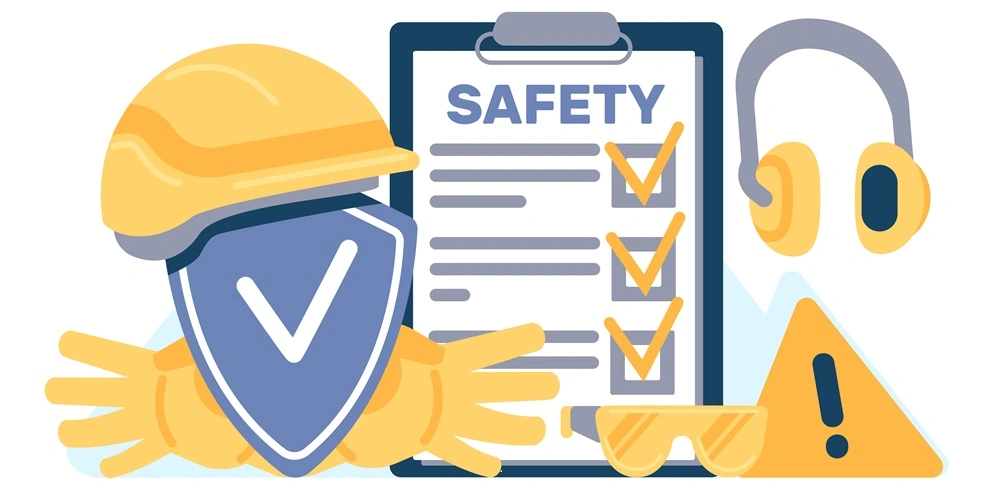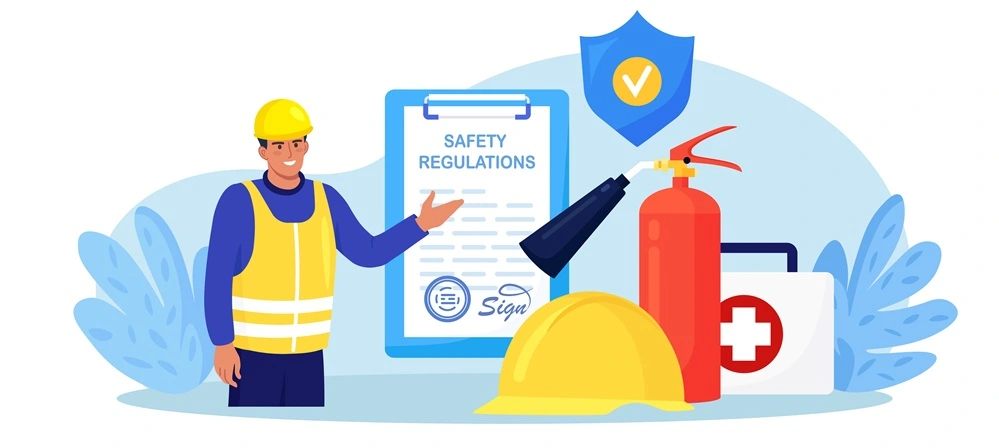Table of Contents
Key Takeaways:
- IOSH stands for the Institution of Occupational Safety and Health – a UK‑based chartered body dedicated to workplace safety and health standards.
- The IOSH certification suite includes awareness‑level courses (e.g., Working Safely), manager level (e.g., Managing Safely), and formal qualifications like the IOSH Level 3 Certificate in Occupational Safety & Health Principles and Practice.
- For engineering aspirants and professionals in India or abroad, IOSH certification adds credibility, enhances safety awareness, opens new career avenues, and helps organisations meet regulatory and best‑practice standards.
- Selecting the right IOSH course depends on your role (worker vs supervisor vs manager) and your career goals; differentiating IOSH from similar bodies (like NEBOSH) is important.
Introduction:
In today’s cutthroat world, safety isn’t just a law requirement; it’s a minimum standard in the workplace. Whether you’re in construction, oil or gas, manufacturing or engineering, having a solid understanding of health and safety management is no longer a nicety, its a necessity.
That’s where IOSH comes in – the Institution of Occupational Safety and Health. Thats an organisation that lays the law down for health and safety across the board.
IOSH certification is one of the most widely recognised and respected health and safety qualifications out there. It gives you the solid grounding you need to identify potential risks, manage workplace safety, and keep up with international standards.
If you’re an engineer, a health and safety professional, or just someone who wants to work in an industrial environment, then this guide is here to help you figure out what IOSH is, why its so important and how in the world you go about getting certified.
What Is IOSH?
The Institution of Occupational Safety and Health (IOSH) is the world’s largest chartered membership organisation for health and safety professionals. It is based in the UK but operates globally.
The body offers training, courses and qualifications designed to raise the standard of workplace health and safety across industries – including engineering, manufacturing, construction, and services.
Why It Matters for Engineering Aspirants & Professionals?
Safety is integral in engineering and industrial roles: Equipment, processes and operations often involve risk. A safety certification adds to your toolkit.
Employability and credibility: Having an IOSH certification shows employers you understand safety protocols, risk management and compliance – increasing your professional value.
Global recognition: While you may work in India, Middle East or other international markets, IOSH certification has international currency, especially in multinational companies.
Better workplace outcomes: Beyond career, it helps create safer workplaces – fewer accidents, better compliance, improved operational efficiency.
IOSH vs Other Certifications
It’s useful to compare IOSH with similar bodies:
IOSH provides courses and membership for general health & safety competence.
NEBOSH is an examination board offering in‑depth qualifications often targeted at full‑time safety professionals.
For many engineering professionals who are not full‑time safety officers but who want safety competence, IOSH is a good fit.
IOSH Certification Levels & Courses
Awareness & Foundation Level Courses
IOSH Working Safely: A one‑day (or 6‑9 hour) course aimed at all employees across sectors. Covers hazards, risk, and basic controls.
Ideal for engineers, technician staff, and professionals who need to know safety basics but are not safety managers.
Managerial Level Courses
IOSH Managing Safely: A three‑day (or virtual/self‑paced) course aimed at managers, supervisors and those with responsibility for others’ safety. Covers risk assessment, incident investigation, safety culture.
If you are a team lead, site supervisor, project engineer – this level is appropriate.
Formal Qualifications
IOSH Level 3 Certificate in Occupational Safety and Health Principles and Practice: This qualification is designed for new or aspiring OSH professionals and is suitable if you already have some role/responsibility in safety.
Comprises units such as OSH principles, risk management, incident management, improving OSH performance etc.
Requires both an exam and a scenario‑based assessment (inspection, risk assessment tasks).
Qualifications & Membership Route
IOSH also offers routes to become a member (affiliate, associate, chartered) based on experience and qualifications.
Qualifications and courses offered by IOSH are regulated (e.g., Ofqual) and deliver structured learning outcomes.
Who Should Take an IOSH Certification?
Engineering Aspirants
- If you’re studying engineering (mechanical, civil, electrical, chemical) and want to strengthen your profile:
- A foundational IOSH Working Safely course demonstrates your awareness of workplace risk beyond just the technical side.
- It can be an edge when applying for internships, apprenticeships, graduate roles in plants or construction sites.
Early Career Professionals
- If you are a junior engineer or technician working on site or with equipment:
- A certificate like Working Safely or Managing Safely shows to your employer you understand safety basics and can contribute to safer operations.
- It helps you stand out when companies look for engineers who also understand HSE (Health, Safety & Environment).
Supervisors, Team Leads & Mid‑Level Professionals
- If you are already in a role with responsibility for crew, site or operations (e.g., team lead, site engineer, project engineer):
- Managing Safely or Level 3 Certificate is more appropriate. You’ll learn how to handle hazards, conduct risk assessments, lead safety initiatives.
- It positions you for roles such as HSE coordinator, safety officer or site manager.
Organisations & Employers
- Companies in industries such as oil & gas, manufacturing, construction, infrastructure value staff with IOSH competence because:
- It helps meet regulatory and audit requirements.
- It builds a safety‑focused culture.
- It reduces risk of accidents, downtime and reputational harm.
How to Get IOSH Certified (Step‐by‐Step)
Choose the Right Course
- Based on your level and role:
- For general awareness → Working Safely.
- For supervisory/manager role → Managing Safely or Level 3 Certificate.
- For deep OSH professional path → Consider advanced IOSH qualifications or NEBOSH later.
Find a Licensed Training Provider
- Ensure the training provider is accredited/licenced by IOSH.
- Check mode (online, virtual, classroom) and duration (one day, three days, etc).
- For Indian learners: verify if the provider offers local schedule, recognition in your country, post‑training support.
Study & Complete Course Requirements
- Attend sessions / complete e‑learning modules.
- Participate in practical tasks (hazard spotting, risk assessment etc).
- Prepare for assessment: multiple choice exam + scenario‑based tasks (for certificate levels).
Get Your Certificate
- Upon successful completion you will receive an IOSH certificate (scan/print). Typical time to issue: about 10 work days.
- The certificate is often valid for life in many cases, though companies may ask for periodic refreshers.
Use It Effectively
- Add the certification to your CV/resume.
- Use in job‑applications: e.g., “IOSH Managing Safely certified”.
- If working at site or plant, present certificate when employer asks for HSE credentials.
- Keep records of your training, ensure compliance for audits.
- Consider next step: Level 3 Certificate or membership upgrade.
Benefits & Career Impact
For Your Career
- Enhances employability especially in sectors requiring safety awareness (construction, manufacturing, infrastructure projects in India).
- Positions you for roles with HSE responsibility, or gives you added dimension as an engineer who understands safety.
- Assists you in complying with site requirements: many plants require all staff to hold at least basic safety training.
For Your Organisation
- Employees with IOSH qualifications help organisations maintain and improve safety standards, reduce accidents and support compliance.
- Demonstrates to clients, regulators and partners that the company is serious about safety culture.
Personal & Professional Growth
- You gain skills in risk‑identification, hazard management, incident investigation – useful even beyond your immediate role.
- It builds professional confidence and opens doors to further learning and membership opportunities.
In the Indian Context
- Safety regulatios in India (via Factory Act, Mines Act, Construction Workers Act etc) are increasingly enforced; having a global standard certificate lends local credibility.
- Many engineering firms, EPC contractors, multinational operating in India value employees with internationally recognised safety credentials.
Cost, Duration & Validity
Duration & Timing
- Working Safely: typically 1 day (6–9 hours).
- Managing Safely: about 3 days classroom or equivalent virtual.
- Level 3 Certificate: Requires units, exam + scenario tasks. Duration depends on provider.
Cost
- Cost varies by provider and location. In India you’ll often find local licensed providers; costs may differ based on mode (online vs classroom), duration, included support.
- Always check: what is included in fee (training materials, exam fee, certificate, membership fees).
Validity
- The certificate often does not expire technically, but safety standards evolve so organisations may request refresher training every few years.
- For membership upgrade (e.g., to Chartered status) you’ll need continuing professional development (CPD).
Action Tip
When choosing a provider, ask: Are they IOSH‑licensed? What is the course fee? Does the fee include certificate? What schedule is friendly for working professionals (weekend, evening, online)?
Common Questions & Misconceptions
Is IOSH only for UK‑based professionals?
No – though UK‑based, IOSH courses are delivered globally, and the certification is recognised internationally.
Is IOSH the same as NEBOSH?
No – IOSH is a membership body offering safety training and qualifications for employees/management broadly; NEBOSH is an exam board offering more advanced qualifications aimed at full‑time safety professionals.
Does one IOSH certificate make me a safety manager?
Not automatically – it gives you competence and recognition, but practical experience, role responsibility and further learning matter.
Will the certificate expire?
Typically no, but your employer may require refresher training and you’ll need to maintain CPD for membership levels.
Does it apply across industries?
Yes – IOSH courses are designed for all sectors: construction, engineering, services, manufacturing etc. The principles are universal with industry‑specific applications.
How Engineering Professionals & Aspirants Should Make the Most of IOSH
Step 1: Align with your career goals
- If you’re just starting (engineering student or newbie), pick Working Safely to build your safety foundation.
- If you lead teams or supervise site work, go for Managing Safely or Level 3 Certificate.
- If you aim for dedicated HSE role later, use IOSH as stepping‑stone and plan for advanced safety qualifications.
Step 2: Integrate learning with your work
- Apply what you learn: hazard spotting in your lab, site or plant; risk assessments for your projects.
- Use your certification to contribute to safety culture: suggest improvements, conduct toolbox talks.
- Document your safety‑initiatives in your portfolio or resume.
Step 3: Leverage the qualification for visibility
- Highlight in your CV: “Certified IOSH Managing Safely”.
- Mention your competence when applying for jobs in plants, EPC, construction, operations.
- Network with IOSH members if possible (some benefits come with membership).
Step 4: Build on it
- Ask your employer if you can move to next level (Level 3 Certificate) or complete a project in safety management.
- Collect continuing professional development points/activities if you plan to upgrade membership.
- Stay updated: safety regulations change, new technologies emerge (e.g., digital safety tools) – being proactive is beneficial.
Conclusion
For engineering aspirants and working professionals who want to strengthen their credentials, increase their safety awareness and broaden their career opportunities in industrial, construction or manufacturing contexts, an IOSH certification offers a practical, globally‑recognised foundation.
From starting with “Working Safely” through to “Managing Safely” or the Level 3 Certificate, you’ll gain knowledge, apply it in your workplace and improve both your professional profile and workplace outcomes. Don’t view it as just another certificate – treat it as part of your career toolkit in engineering + safety.
If you’re working in India (or planning to), research accredited providers, pick the course that fits your role, commit to applying what you learn and use the certification to differentiate yourself. Safety is not a side-note’s integral to engineering excellence.
Take the step now: pick your IOSH course, complete it, apply the skills, and enhance both your career and your workplace’s safety culture.
Frequently Asked Questions
What is the difference between “IOSH Working Safely” and “IOSH Managing Safely”?
Working Safely is an entry‑level course for all employees covering basic hazards and risk. Managing Safely is for managers/supervisors and includes responsibility, risk assessment, incident investigation.
Is an IOSH certificate recognised in India?
Yes – while it is UK‑based, many Indian companies, especially engineering, construction, oil & gas, accept IOSH qualifications as evidence of health & safety competence. Regional providers deliver the courses in India.
How long does the certificate last?
Technically the certificate does not expire, but for best practice you should undertake refreshers. Accreditation to higher levels may require CPD.
How much does it cost to do IOSH certification in India?
The cost varies by provider, mode (online vs classroom), duration and materials. It’s best to compare multiple titled providers and check what’s included (training, exam, certificate).
Can engineers move into safety roles by just doing IOSH?
IOSH gives you competency, but moving into dedicated HSE roles also depends on experience, project exposure, industry sector and often advanced safety qualifications. Use IOSH as a stepping stone.
Are there practical assessments in IOSH courses?
Yes – for Level 3 Certificate and some managerial courses you’ll have scenario‑based assessments (risk assessment task, workplace inspection) besides multiple‑choice tests.
Does IOSH cover only physical safety hazards?
No – it covers a broad spectrum including physical, chemical, environmental, organisational hazards, incident investigation, safety culture.
Can I study IOSH online?
Yes – many licensed providers offer virtual or online delivery modes of IOSH courses, depending on region and provider.
How do I verify an IOSH certificate?
IOSH provides an online checker tool where you can verify certificate number, course name and candidate name.
What are the membership levels after IOSH certification?
IOSH membership includes different grades: Affiliate, Associate, Technical Member, Certified Member, Chartered Member – each with its own criteria of experience and qualification levels.















